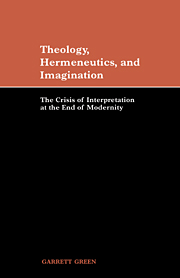Book contents
- Frontmatter
- Contents
- Preface
- 1 Theological hermeneutics in the twilight of modernity
- Part I The modern roots of suspicion
- 2 The scandal of positivity: the Kantian paradigm in modern theology
- 3 Against purism: Hamann's metacritique of Kant
- 4 Feuerbach: forgotten father of the hermeneutics of suspicion
- 5 Nietzschean suspicion and the Christian imagination
- Part II Christian imagination in a postmodern world
- Appendix: Hamann's letter to Kraus
- Bibliography
- Index
5 - Nietzschean suspicion and the Christian imagination
Published online by Cambridge University Press: 22 September 2009
- Frontmatter
- Contents
- Preface
- 1 Theological hermeneutics in the twilight of modernity
- Part I The modern roots of suspicion
- 2 The scandal of positivity: the Kantian paradigm in modern theology
- 3 Against purism: Hamann's metacritique of Kant
- 4 Feuerbach: forgotten father of the hermeneutics of suspicion
- 5 Nietzschean suspicion and the Christian imagination
- Part II Christian imagination in a postmodern world
- Appendix: Hamann's letter to Kraus
- Bibliography
- Index
Summary
Is the cross an argument?
NietzscheFor the word of the cross is folly to those who are perishing, but to us who are being saved it is the power of God.
1 Corinthians 1.18Several years ago in an introductory religious studies class I was reading aloud the famous “death of God” speech by Nietzsche's madman. Midway through the passage, I looked up to notice a young African-American woman at the back of the classroom who had both hands clamped firmly over her ears, which she kept in place until I finished reading. She left the classroom hurriedly at the end of the hour and never returned after that day. One part of me found her response gratifying. She, at least, got Nietzsche's point, unlike the other blasé undergraduates (most of whom were white, well-to-do products of Christian, Jewish, or secular liberalism). For her it mattered whether God is the God of the living or the dead. On the other hand, her gesture epitomized all too graphically an attitude common among modern believers (though rarely exhibited so concretely): they are unwilling to hear challenges to the truth of their faith, and at the root of that unwillingness is cowardice; they do not believe that they can meet the challenge, and they are afraid to try.
- Type
- Chapter
- Information
- Theology, Hermeneutics, and ImaginationThe Crisis of Interpretation at the End of Modernity, pp. 109 - 140Publisher: Cambridge University PressPrint publication year: 1999

